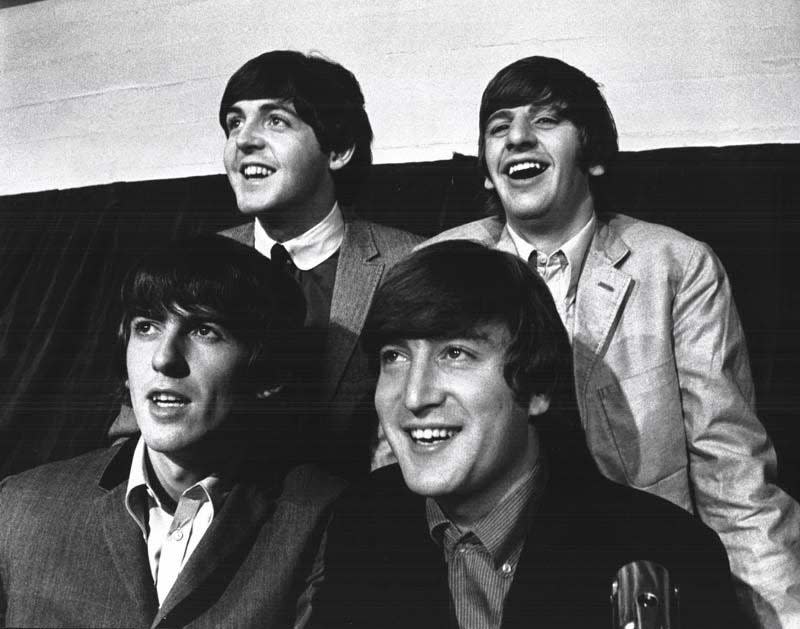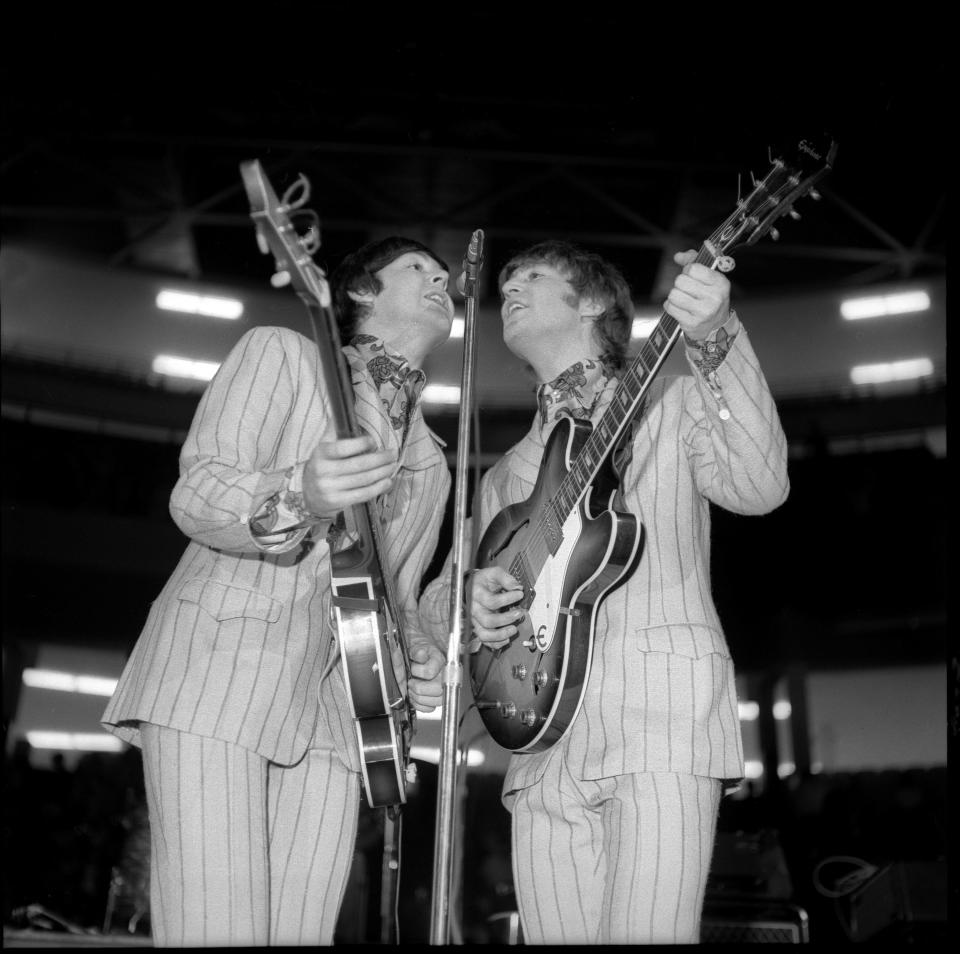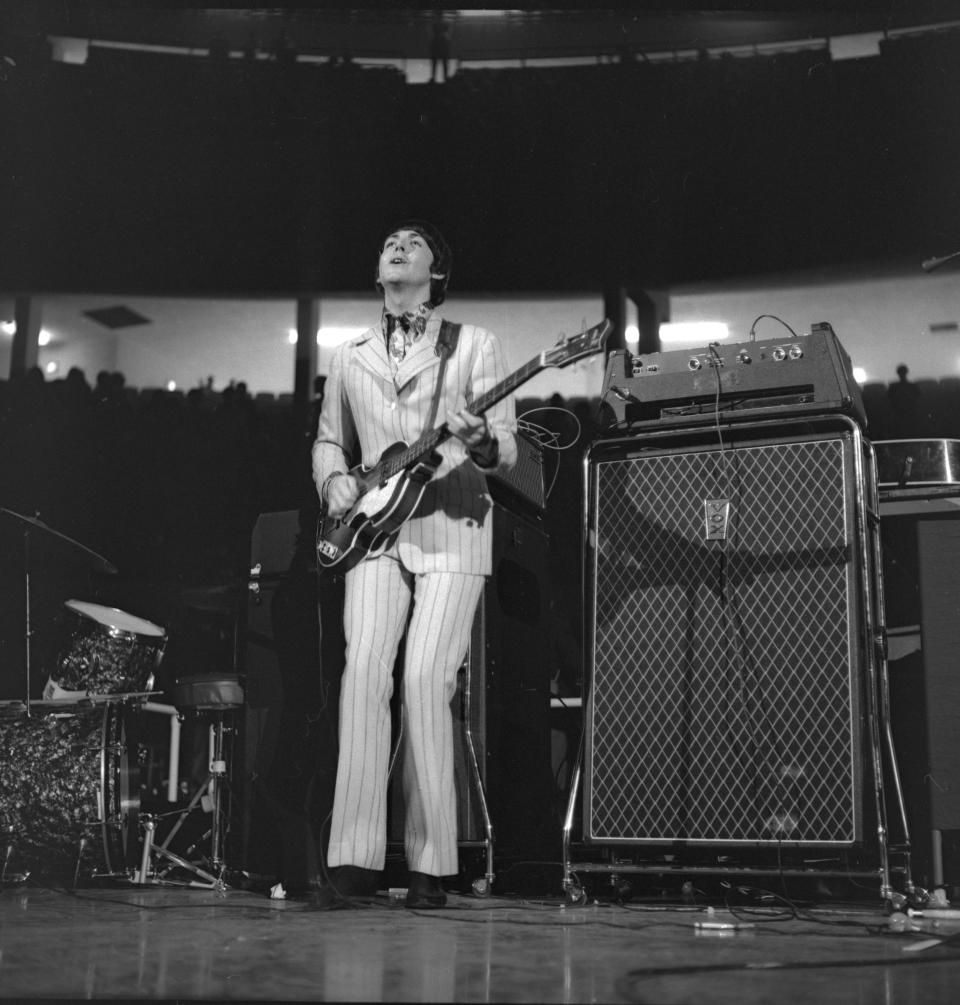Flashback: Freep reporter met John Lennon in 1966. Later he was best man at her wedding.
- Oops!Something went wrong.Please try again later.
The Beatles played two sold-out concerts before a total of 28,000 screaming fans at Olympia Stadium on Aug. 13, 1966, the last time the Fab Four performed in Detroit. Loraine Alterman, the Free Press “teen writer” who covered pop music, interviewed John Lennon, Paul McCartney and George Harrison before the 2 p.m. show. (Ringo Starr was not available.) The interview, which ran Aug. 19, 1966, has been edited for length.
Get George talking about Indian music as he's perched on a table top with his legs tucked in front of him, and his eyes light up.
He looked straight into my eyes and he spoke with great intensity. George is interested in the work of Ravi Shankar, the Indian sitar player. George used the sitar on cuts for the Beatles "Rubber Soul" and "Revolver” albums. How did an Englishman get so hung up on Indian music?
"A whole lot of things got me interested," he said. “The more I heard it, the more I liked it. It's very involved music. So involved. That's why the average listener doesn't understand. They listen to Western music all their lives. Eastern music is a different concept. Indian music is hip, yet 3,000 years old.
"I find it hard to get much of a kick out of Western music. Even out of Western music I used to be interested in a year ago. Most music is still only surface, not very subtle compared to Indian music. Music in general, us included, is still on the surface.
That last remark is indicative of the Beatles attitude — they are not big-headed stars, they can tear themselves down on occasion. They really come on as artists aware of their talent, but not wrapped up in themselves.

"You might include this in your article," George went on. "For anyone who likes music a lot and has a good understanding of it, let me suggest they listen to Indian classical music. I'd like to see more people interested in it, honestly interested. Not just to cash in on the sitar boom.
"On ‘Norwegian Wood,' on the ‘Rubber Soul’ album, I used the sitar like a guitar. On the new album I developed it a little bit but I'm far from the goal I want to achieve.
“It will take me 40 years to get there. I'd like to be able to play Indian music as Indian music instead of using Indian music in pop. It takes years of studying, but I'm willing to do that."
George put his opinion of the Beatles' effect on pop music this way: "We were right for the time when we came out. The pop scene five years ago was definitely looked upon by ‘musicians,’ put that in brackets, as a dirty word. Pop was just something crummy. Now I think a lot of things in the pop field have more to them. We're very influenced by others in pop music and others are influenced by us. That's good. That's the way life is. You've got to be influenced and you try to be influenced by the best."
More from the Freep Flashback: Detroit's Chess Mate, the forgotten incubator of Joni Mitchell
John proves to be a cool one
Tony Barrow interrupted and brought over John. He peered through his yellow glasses, and I was a little nervous because I had read that if he was bored by the questions, he would cut you down with his wit. I shouldn't have worried. Not only did he listen to the questions, but he put thought into his answers. While he wasn't as intense as George, he was just as sincere.

He gives the appearance of being a perceptive, intelligent man. On stage he's cool, slightly rocking his head with the beat, concentrating on his guitar. He hardly seems the type girls scream for, but they do. He's just as cool off stage.
Do the Beatles still thrill to the screams?
"It's just there," John answered. "If it's not there it's noticeable by its absence. You expect to hear it. You expect it to howl like your amps howl. It would be unnerving without it."
John talked about his song writing.
"I usually just make something up," he said. "When you get down to it, it's all based on actual experiences but I never consciously think of any. It varies immensely. Some of it is just whatever comes into my head."
Another Beatles Flashback: The wild night John Lennon showed up to free marijuana martyr John Sinclair
Like George, John is open to influence in music. "Everything I hear influences me if I like it — any music, pop, or classical, or anything else." Beatle music itself, according to John, "has progressed and gotten more like Beatle music. Before it was more of anyone else's music."
I wondered why the Beatles reversed the tape on the last part of their single record "Rain" so that it came out backwards at the end.
"After we recorded it, it wasn't long enough," John explained. "I took it home. It was 4 in the morning and I played it backwards. I was knocked out."
As you may have read, the recording session for "Revolver" took a good two weeks of hard work, day and night. John said that it took him and Paul longer to get started once the recording date was set.
"Paul and I didn't snap to it like normally. We worked hard because we wanted everything so perfect. On the ‘Rubber Soul’ album we found out a lot technically. Things have come into focus. From there we could evolve into ‘Revolver.’ ”
I asked John if he had been surprised by the adverse reaction to his now famous statement — “we're more popular than Jesus now.”
"I was shocked out of me mind. I couldn't believe it," he said. "I'm more religious and more interested in religion now than I ever was."
Paul has a devilish grin
It was time to move on to the handsomest Beatle of all, Paul. With a devilish grin he asked me to sit beside him on the table and rub knees. I told him that I could make some extra money by selling my knees to hundreds of girls clustered around Olympia's entrances. He laughed and swore he could sell his for more money than I could get.

Turning to a more serious side, Paul said that his inspiration for songs comes "mainly from imagination. Take ‘Eleanor Rigby.’ It just came. When I started doing the melody I developed the lyric. It all came from the first line. I wonder if there are girls called Eleanor Rigby. Originally I called her Miss Daisy Hawkins. Father MacKenzie was Father McCartney originally. But people would have thought it was my father. ‘Yellow Submarine' is very simple but very different. It's a fun song, a children's song. Originally we intended it to be 'Sparky,’ a children's record.
“But now it's the idea of a yellow submarine where all the kids went to have fun. I was just going to sleep one night and thinking if we had a children's song, it would be nice to be on a yellow submarine where all your friends are with a band.”
In writing a song Paul and John usually work it out on the guitar. "We use a tape recorder if the song is difficult," said Paul, "but normally we can remember them."
Paul can't read or write music although he is taking lessons. "I may learn eventually, but I'm lazy. The only thing that makes me learn is that it’s silly I can't read music. It’s not that difficult. But it's easy to compose without being able to write it down."
What does Paul think the Beatles have done to pop music?
"Given it a bit of common sense. A lot of it was just a bit insincere, I think. Five years ago you'd find men of 40 recording things without meaning it just to make a hit. Most recording artists today really like what they're doing and I think you can feel it on the records."
The writer of this story, Loraine Alterman, left the Free Press in the late 1960s and eventually worked for Rolling Stone magazine. Covering the arts scene in New York City, she was interviewing Mel Brooks on the set of “Young Frankenstein” when she met famed actor Peter Boyle. They married in 1977. Their best man was John Lennon, the ex-Beatle whom they knew from Alterman’s friendship with Lennon’s wife, Yoko Ono. Boyle died in 2006 at 71 from multiple myeloma. Alterman is active in raising funds for the International Myeloma Foundation.
This article originally appeared on Detroit Free Press: What the Beatles had to say before their last Detroit shows in 1966

